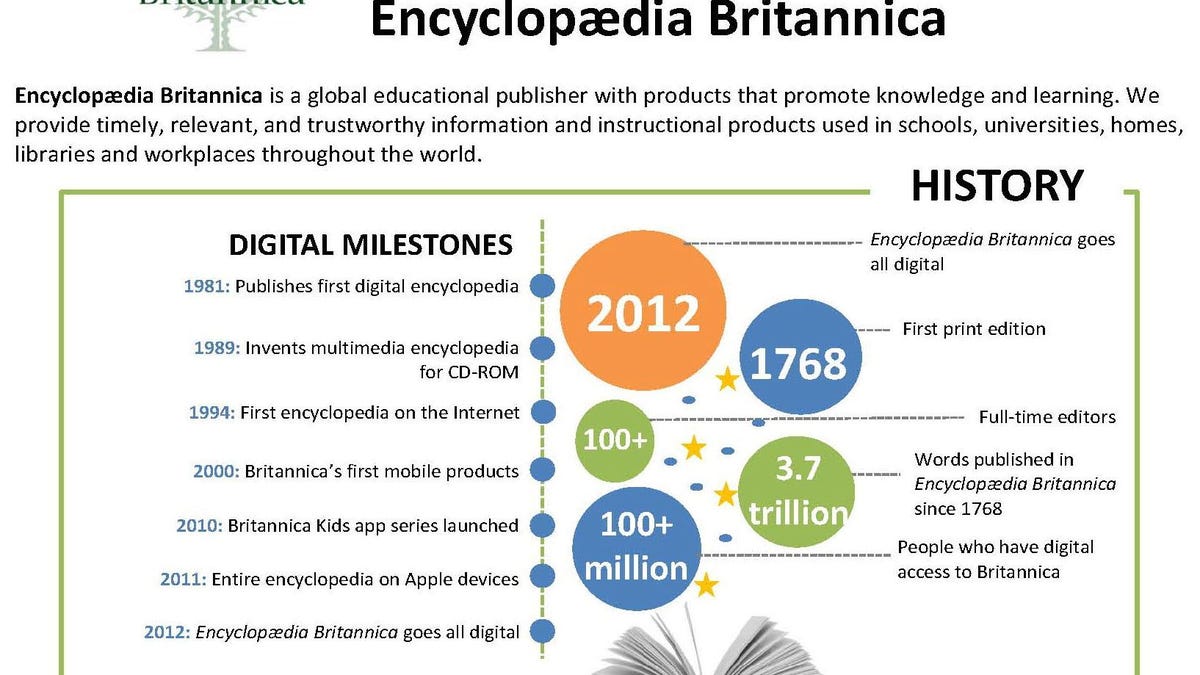Encyclopaedia Britannica drops print and goes digital only
After 244 years of printing volumes of books, the venerable encyclopedia publisher shifts toward computer-only access.

Gone are the days of walking over to the bookshelf, grabbing an Encyclopaedia Britannica, and flipping through the pages to look up whatever piqued one's curiosity. The leather-bound print edition set of reference books is now defunct, the company announced today.
However, Encyclopaedia Britannica is also quick to say that this change isn't its swan song. Now, in the digital age, the company will focus on its online encyclopedias and educational curriculum for schools.
"In spite of our long history with print, I would like to point out that no single medium, neither books nor bits, is at the core of our mission," Encyclopaedia Britannica President Jorge Cruz said in a statement. "That mission is to be a reliable, up-to-date, and scholarly source of knowledge and learning for the general public."
Encyclopaedia Britannica got its start 244 years ago by three Scotsmen who wanted to bring scholarly knowledge to the public. It is the oldest continuously published encyclopedia in the English language, according to The New York Times. Throughout the years, the books grew from three volumes into a 32-volume set.
The 2010 edition is the last print edition of the encyclopedia and has more than 4,000 contributors, including pro golfer Arnold Palmer, NASA scientist Jack J. Lissauer, and dozens of Nobel Prize winners. According to The New York Times, the entire set costs $1,395 and only 8,000 copies have been sold; 4,000 remaining copies have been warehoused until sold.
Encyclopaedia Britannica's sales peaked in 1990 with the sale of 120,000 sets, just before the boom of the Internet. It has been downhill for print sales ever since. Some people point to Wikipedia as one of the factors in the print encyclopedia's demise.
It seems that with the revamp of its online encyclopedia, Encyclopaedia Britannica is looking to mirror Wikipedia's expansive information model along with adding educational tools, platforms, and multimedia. The company says that Britannica is now available to more than 100 million people every day around the world.
"Today our digital database is much larger than what we can fit in the print set," Cruz said. "And it is up to date because we can revise it within minutes anytime we need to, and we do it many times each day."
The company's digital packing includes expanded coverage, supplemental materials, full-text searching, hypertext linking, interaction with users, and more. The entire Encyclopaedia Britannica package is also accessible through an app for the iPad, iPhone, and iPod Touch.
"I understand that for some the end of the Britannica print set may be perceived as an unwelcomed goodbye to a dear, reliable, and trustworthy friend that brought them the joy of discovery in the quest for knowledge," Cruz said. "At Encyclopaedia Britannica we believe that the announcement that we will no longer print the 32-volume encyclopedia is of great significance, not for what it says about our past, but for what it projects about our vibrant present and future as a digital provider of general knowledge and instructional services."
Britannica Online will be entirely free for a full week beginning today.

